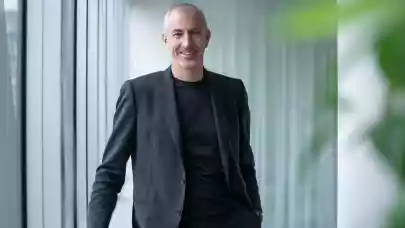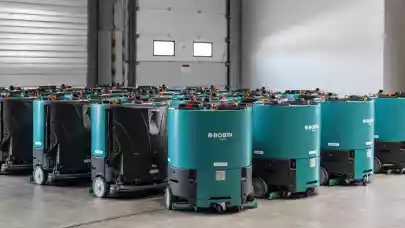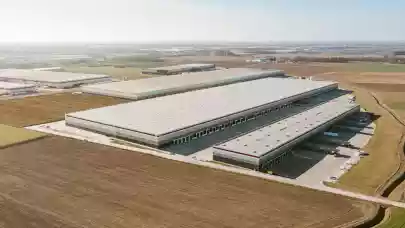
Charles Boudet, CEO of iO Partners, spoke to Property Forum about the ongoing expansion plans of the real estate consultancy in the region and the trend of foreign investors returning to their core markets.
What is the development vision of iO Partners in the region and what are your goals for the next years?
What is beautiful about iO Partners is that it is both a company that has over 30 years’ worth experience of doing outstanding work for clients in this region, but also a newborn. And that is incredibly exciting when you are in my position because you have a very strong foundation to build on, but you can also allow yourself to be incredibly ambitious because the whole future is there to be written.
The development vision of iO Partners is firstly to be a reference in the real estate market as a consulting company that is just not like the others. We aim to be recognized in the CEE region, but also broader, as professionals who do things the smart way, who take the extra step and deliver more value and who provide an environment that is more fun to work in than elsewhere.
I think that is the starting point in terms of culture and who we aspire to be. There is obviously also a huge amount of development potential business-wise, in terms of other business lines that we intend to start and other geographies which we are trying to address. We have already, in a very short time, opened an office and have a new team working in Serbia, and we are already considering other geographies within the region that would come and complement our offer.

Charles Boudet
CEO
iO Partners
How are you standing out in the competition for talent?
I think that in today's competitive environment, companies that will succeed need to be able to bring different ingredients to be able to attract the best people. What we are trying to do with iO is firstly to embrace the innovative way of doing things and really embed within our culture and values a progressive view. That brings with itself a whole new way of doing things - it means spending money and time on innovation, trying to constantly test boundaries of how things can actually be done differently and having a great technology strategy to be able to digitise our business more. It also means developing a culture where we are allowed to fail because we cannot expect that everything that will be tested, will succeed. I find this to be an important cultural aspect that will make iO an incredible place to work.
Secondly, we want to bring together the best of the global knowledge of our history of being a large corporation and the agility and entrepreneurial spirit of being a very agile local company.
I think that this combination is probably a unique selling point in today's consulting world that will make iO Partners a much more desirable place to work and therefore able to bring the best talent on the market.
What is your approach to innovation in the real estate consultancy field?
With regard to innovation, I think the best ideas come from a combination of a top-down strategic direction and a bottom-up expression of ideas and new ways of doing things. I think this is what our approach to innovation is in iO. We are structuring ourselves to have a data culture and an aspiration to try new things, which is really the top-down element, the foundation that allows innovation to happen. And then we're developing a culture of trial and error which will allow those who are closest to our clients, who hear their needs first-hand and who are able to really get into their mind to be able to come up with ideas.
What is your take on AI and does it have the power to shape the future of the real estate sector?
Within the whole realm of innovation, artificial intelligence (AI) is the one big topic that we are trying to put our hands around and which we think will be the most transformational aspect for all companies, not only in real estate. It is a real revolution that touches white collars. When you are a consultant in that field, there are a lot of aspects of your work that can be done quicker, better, more efficiently with higher quality and in a differentiated way, with the use of AI.
We are trying to embed AI in the way we interact with clients, in the reports and documents that we produce, and we are trying to use predictive AI to better help our clients anticipate the moves they need to make with regard to their real estate.
Which are the fastest-growing markets in your regional network?
I cannot say one market is growing more and others less. Different activities are developing at different speeds, and I think the real beauty of our operating model is that we are a diversified business. We have transactional businesses that have a certain cycle, while the investment and leasing businesses have different cycles.
We are diversified in terms of asset classes between office, industrial and a bit of retail, and we also have a very big part of our business in consulting through valuation, project management and different types of advisory. I think that it is really the perfect mix that allows us to grab the opportunities in the different markets as they arrive.
How aware are international investors of the real estate development potential in CEE?
International investors, in general, are very educated on the different types of real estate and the different types of geographies. Many of them have invested in the past and are continuing to do so in the CEE region. I would say they are very aware of the potential and the challenges that the CEE region has today.
Commercial real estate is going through a large transformation and a form of crisis because the value creation elements are changing structurally with the increase of interest rates, level of inflation, and different monetary policies, with the whole wave of ESG which is transforming what is considered a performing or less performing asset.
When things are difficult, people go back to their core - when they have tested other activities, they go back to their main activity and when they've tested other geographies, they go back to their main geography. Right now, as we are speaking, we are seeing overall a tendency where foreign investors go back to their core foreign market. This is definitely something that we will see in the coming 24 months as the real estate markets find their level of normality in their refined form again. The expansion towards the East will come back and the CEE markets have a lot of arguments in their favour. We are definitely seeing an appetite for reshoring after COVID.
Central Europe, which already has so much experience with a lot of firms that already operate today at a high level of qualification, is really the sweet spot of production for Europe. Also, there is more availability of land, which means that the energy market, which is also undergoing a complete restructuring, will develop in Central Europe, where everybody is trying to increase the amount of renewable energy. There are plenty of positive arguments to be made, some of which we are already taking advantage of in Romania and in other places.
How is Europe’s ambition to become carbon-neutral supporting innovation in real estate?
I think this is a complex matter and there is no straight answer, for a number of reasons.
Firstly, I would say it’s a European aspiration, rather than an ambition, that evolves in different ways and at different speeds in different geographies, depending if they have already reached a certain level of maturity in their real estate. Also, it depends on whether their topic is really restructuring and rethinking their current real estate to adapt it to the new environmental norms, or if they still have a way of developing as we have in some parts of central Europe.
Any type of innovation requires two things: one is a burning platform - and I think the climate change urgency in Europe is definitely perceived as a burning platform and a good foundation to be able to induce change. The other thing innovation needs is means and resources, and that's what's more difficult today, where there are a lot of parts of real estate that have lost value or that have other more stringent challenges and I think the role and responsibilities of all the real estate players are to make sure that the carbon neutral urgency doesn't leave from the top priority and trickle down the list of priorities. I think we all have a responsibility to play here, including iO Partners.



